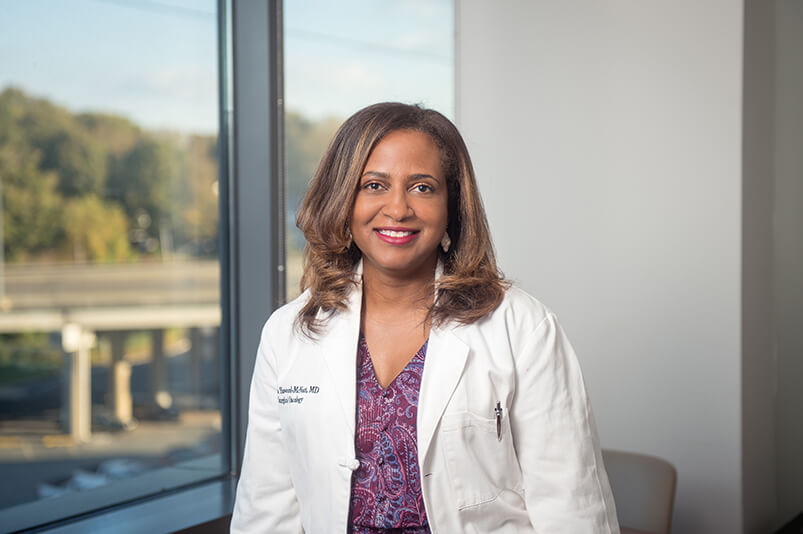There are less than 20 African-American female surgeons who have full professorships in the United States. Marissa Howard-McNatt, MD, professor of surgical sciences – oncology, is one of them.
Howard-McNatt attended an all-girls undergraduate university where she became heavily interested in women’s health. She attended Harvard Medical School and during this time discovered her love for surgery. Howard-McNatt merged her three main interests – women’s health, surgery and oncology – and became a surgical breast oncologist. These days she’s the director of the Breast Care Center and the co-lead for the breast solid tumors board at Atrium Health Wake Forest Baptist's NCI-designated Comprehensive Cancer Center, which is part of Atrium Health Levine Cancer. She’s also the co-lead for the breast disease oriented team and the vice-chair of the committee for faculty promotion and tenure.

When not in the operating room or at the bedside, Howard-McNatt can be found working on her research. Her interests and specialties include breast neoplasms, disparity research, genetic testing, lobular carcinomas and papillary carcinomas. She credits her research as an empowerment to her as it helps to advance patient care and improves outcomes for patients. Get to know her in her own words.
What’s the most exciting research you’ve worked on?
I have worked on many exciting projects. One has been the SHAVE Study. This was a multi-institutional trial looking at shaved margins during breast-conserving surgery.
Currently, I am working on the I-SPY trial. This is a multiplatform study looking at many aspects of breast cancer care. It is ever evolving and involves surgeons and medical oncologist from throughout the country. It’s a special group because they are willing to listen to new ideas.
What professional accomplishments are you most proud of?
I am proud that I became a professor of surgery. There are few female surgeons in the United States. Furthermore, there are less than 20 African-American female surgeons in the United States who are full professors – I am proud to be one of these women. I hope to help inspire the future generation of female surgeons.
How close do you think we are to preventing or finding a cure for breast cancer?
To me, breast cancer has become a disease where some women are quickly cured with multimodality care. For other women, it is a chronic condition, which they may have for years. Breast cancer is not a death sentence. Women can, and do, conquer the disease. I’m hopeful and excited for the continued advancements to come.
What advice would you give to young researchers?
Listen to your patients. They will give you research ideas especially on how to make their treatments and life better. It’s also important to seek out colleagues in different fields to help you with your research. Additionally, I’ve found it helpful to ask friends at other institutions to partner with you on certain initiatives.
What’s something you would like people to know about you?
I am a wife and a mother of three girls. My undergraduate degree is in music; I play the violin and enjoy singing in choirs.
